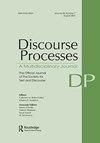It’s Contagious! Examining Gamified Refutation Texts, Emotions, and Knowledge Retention in a Real-World Public Health Education Campaign
IF 2.1
2区 心理学
Q2 PSYCHOLOGY, EDUCATIONAL
引用次数: 1
Abstract
ABSTRACT The current study investigated the relations between gamified refutations of COVID-19 misconceptions and individuals’ emotional reactions and knowledge retention within a large-scale public health education campaign. Refutations have a substantial body of evidence supporting their use to correct misconceptions, yet reduced efficacy has been observed for some topics that generate negative emotional responses. We tested whether gamification could mitigate these limits given that it capitalizes on positive affective engagement. From May to December 2020, approximately 200,000 individuals were recruited from social media in Canada to engage with a nongame interactive survey as a control or a fully gamified platform focused on correcting COVID-19 misconceptions. Gamification was associated with a greater number of happiness and anxiety responses and fewer responses of anger and skepticism in reaction to having misconceptions corrected by refutations. Further, participants who engaged with gamified refutations retained correct information after a brief period. Finally, happiness and anxiety were positively associated with and anger and skepticism were negatively associated with retention of refutation information and support for related public health policies. Implications for scaling up and reinforcing the benefits of refutations for public engagement with science are discussed.是会传染的!在现实世界的公共卫生教育运动中检验游戏化反驳文本、情感和知识保留
摘要本研究调查了在大规模公共卫生教育活动中,对新冠肺炎误解的游戏化驳斥与个人情绪反应和知识保留之间的关系。反驳有大量证据支持它们用于纠正误解,但在一些产生负面情绪反应的话题中,观察到效果降低。我们测试了游戏化是否可以缓解这些限制,因为它利用了积极的情感参与。2020年5月至12月,加拿大从社交媒体招募了约20万人参与非游戏互动调查,作为一个控制或完全游戏化的平台,专注于纠正新冠肺炎的误解。游戏化与更多的快乐和焦虑反应有关,而对通过反驳纠正误解的愤怒和怀疑反应较少。此外,参与游戏化反驳的参与者在短暂的时间后保留了正确的信息。最后,幸福和焦虑与反驳信息的保留和对相关公共卫生政策的支持呈正相关,愤怒和怀疑与否呈负相关。讨论了扩大和加强反驳对公众参与科学的好处的影响。
本文章由计算机程序翻译,如有差异,请以英文原文为准。
求助全文
约1分钟内获得全文
求助全文
来源期刊

Discourse Processes
Multiple-
CiteScore
4.30
自引率
4.50%
发文量
27
期刊介绍:
Discourse Processes is a multidisciplinary journal providing a forum for cross-fertilization of ideas from diverse disciplines sharing a common interest in discourse--prose comprehension and recall, dialogue analysis, text grammar construction, computer simulation of natural language, cross-cultural comparisons of communicative competence, or related topics. The problems posed by multisentence contexts and the methods required to investigate them, although not always unique to discourse, are sufficiently distinct so as to require an organized mode of scientific interaction made possible through the journal.
 求助内容:
求助内容: 应助结果提醒方式:
应助结果提醒方式:


